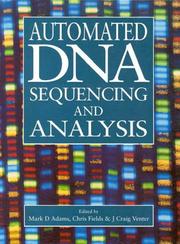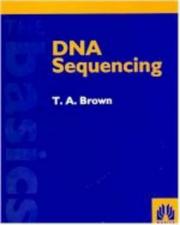| Listing 1 - 10 of 26 | << page >> |
Sort by
|
Book
ISBN: 1859960618 Year: 1997 Publisher: Oxford BIOS scientific publ.
Abstract | Keywords | Export | Availability | Bookmark
 Loading...
Loading...Choose an application
- Reference Manager
- EndNote
- RefWorks (Direct export to RefWorks)
Nucleotide sequence --- Bioinformatics --- Séquence nucléotidique --- Bio-informatique --- 577.212.3 --- Nucleic acid base and sequence compositon. Experimental deciphering of genetic code. --- Nucleotide sequence. --- 577.212.3 Nucleic acid base and sequence compositon. Experimental deciphering of genetic code. --- Séquence nucléotidique

ISBN: 0127170103 0080926398 Year: 1994 Publisher: London Academic press
Abstract | Keywords | Export | Availability | Bookmark
 Loading...
Loading...Choose an application
- Reference Manager
- EndNote
- RefWorks (Direct export to RefWorks)
577.212.3 --- 57.088.5 --- Nucleic acid base and sequence compositon. Experimental deciphering of genetic code. --- Methods and techniques for studying structures and properties of biological molecules --- 577.212.3 Nucleic acid base and sequence compositon. Experimental deciphering of genetic code. --- DNA --- Nucleotide sequence --- Data processing.

ISBN: 0879696362 9780879696368 Year: 2003 Publisher: Cold Spring Harbor Cold Spring Harbor laboratory
Abstract | Keywords | Export | Availability | Bookmark
 Loading...
Loading...Choose an application
- Reference Manager
- EndNote
- RefWorks (Direct export to RefWorks)
Molecular biology --- 577.212.3 --- 57.081 --- Nucleic acid base and sequence compositon. Experimental deciphering of genetic code. --- General organization of biological laboratories --- 57.081 General organization of biological laboratories --- 577.212.3 Nucleic acid base and sequence compositon. Experimental deciphering of genetic code. --- Molecular Biology --- Molecular biochemistry --- Molecular biophysics --- Biochemistry --- Biophysics --- Biomolecules --- Systems biology --- Nucleic acid base and sequence compositon. Experimental deciphering of genetic code
Book
ISBN: 3527318852 3527622551 9783527318858 9783527622559 Year: 2008 Publisher: Weinheim Wiley-VCH
Abstract | Keywords | Export | Availability | Bookmark
 Loading...
Loading...Choose an application
- Reference Manager
- EndNote
- RefWorks (Direct export to RefWorks)
Genome, Plant. --- Genomics --- Plant genetics. --- Plant genomes. --- Plants --- Methods. --- Genetics. --- Plant genetics --- Plant genomes --- 57.088 --- 577.212.3 --- Plant genome --- Genomes --- Genetics --- 577.212.3 Nucleic acid base and sequence compositon. Experimental deciphering of genetic code. --- Nucleic acid base and sequence compositon. Experimental deciphering of genetic code. --- 57.088 Special methods and techniques for studing biological molecules. Separation. Centrifuging. X-ray study. Radioisotope methods --- Special methods and techniques for studing biological molecules. Separation. Centrifuging. X-ray study. Radioisotope methods

ISBN: 1859962734 Year: 2004 Publisher: Abingdon BIOS scientific publ.
Abstract | Keywords | Export | Availability | Bookmark
 Loading...
Loading...Choose an application
- Reference Manager
- EndNote
- RefWorks (Direct export to RefWorks)
The Advanced Text series is designed for students taking advanced-level courses, including final year undergraduates and taught MSc. Marine microbiology is a rapidly expanding subject. New tools and an increased interest in ecological factors have caused an upsurge of interest in this field of study. This book aims to convey the fascinating discoveries and great importance of this fast-moving discipline to the student. Proteomics is a major new area of scientific research driven by the growing information gap between genes and their functions. Large-scale DNA sequencing and annotation projects identify thousands of new genes on a daily basis but the functions of these genes remain largely unknown. Proteins are the actual functional molecules of the cell, and technical advances in the high-throughput analysis of proteins now allow these molecules to be studied directly. Principles of Proteomics provides a comprehensive introduction to this relatively new field, for the first time bringing together all the disparate themes of proteomics. The book covers the development of large-scale technologies for protein separation, isolation, detection and quantitation. It describes in detail the role of mass spectrometry in high-throughput protein annotation. It also covers the emerging fields of structural proteomics, interaction proteomics and the recent development of chip-based analysis techniques. The final chapter provides some examples of how proteomics is being applied in the fields of medicine, biotechnology and agriculture.
Proteomics. --- 577.212.3 --- 577.112 --- 57.088 --- Nucleic acid base and sequence compositon. Experimental deciphering of genetic code. --- Proteins --- Special methods and techniques for studing biological molecules. Separation. Centrifuging. X-ray study. Radioisotope methods --- Aminozuursequenties --- Eiwitten --- Structuur --- Aminozuursequenties. --- Eiwitten. --- Structuur. --- 57.088 Special methods and techniques for studing biological molecules. Separation. Centrifuging. X-ray study. Radioisotope methods --- 577.112 Proteins --- 577.212.3 Nucleic acid base and sequence compositon. Experimental deciphering of genetic code. --- Proteomics --- Molecular biology --- Nucleic acid base and sequence compositon. Experimental deciphering of genetic code --- Moleculaire biologie.

ISBN: 9780199299188 Year: 2007 Publisher: Oxford Oxford university press
Abstract | Keywords | Export | Availability | Bookmark
 Loading...
Loading...Choose an application
- Reference Manager
- EndNote
- RefWorks (Direct export to RefWorks)
575.86 --- 577.212.3 --- 57.088.5 --- Origin of groups of organisms (taxa). Phylogeny --- Nucleic acid base and sequence compositon. Experimental deciphering of genetic code. --- Methods and techniques for studying structures and properties of biological molecules --- GEN Genetics & Population Genetics --- phylogeny --- evolution --- ancestral state --- mutations --- history --- 577.212.3 Nucleic acid base and sequence compositon. Experimental deciphering of genetic code. --- 575.86 Origin of groups of organisms (taxa). Phylogeny --- Evolutionary genetics --- Nucleotide sequence --- Analysis, Nucleic acid sequence --- Analysis, Nucleotide sequence --- Base sequence (Nucleic acids) --- DNA sequence --- Nucleic acid sequence analysis --- Nucleotide sequence analysis --- RNA sequence --- Sequence, Nucleotide --- Nucleic acids --- Nucleotides --- Sequence alignment (Bioinformatics) --- Genetic evolution --- Evolution (Biology) --- Genetics --- Analysis

ISBN: 0896032469 0896032760 159259512X 1592595111 Year: 1994 Volume: 24, 25 Publisher: Totowa, NJ : Humana Press : Imprint: Humana,
Abstract | Keywords | Export | Availability | Bookmark
 Loading...
Loading...Choose an application
- Reference Manager
- EndNote
- RefWorks (Direct export to RefWorks)
DNA sequencing has become increasingly efficient over the years, resulting in an enormous increase in the amount of data gener ated. In recent years, the focus of sequencing has shifted, from being the endpoint of a project, to being a starting point. This is especially true for such major initiatives as the human genome project, where vast tracts of DNA of unknown function are sequenced. This sheer volume of available data makes advanced computer methods essen tial to analysis, and a familiarity with computers and sequence analy sis software a vital requirement for the researcher involved with DNA sequencing. Even for nonsequencers, a familiarity with sequence analysis software can be important. For instance, gene sequences already present in the databases can be extremely useful in the design of cloning and genetic manipulation experiments. This two-part work on Computer Analysis of Sequence Data is designed to be a practical aid to the researcher who uses computers for the acquisition, storage, or analysis of nucleic acid (and/or pro tein) sequences. Each chapter is written such that a competent scien tist with basic computer literacy can carry out the procedure successfully at the first attempt by simply following the detailed prac tical instructions that have been described by the author. A Notes section, which is included at the end of each chapter, provides advice on overcoming the common problems and pitfalls sometimes encoun tered by users of the sequence analysis software.
Amino acid sequence --- Nucleotide sequence --- Data processing. --- 577.212.3 --- 57.088.5 --- 57.081.2 --- 57.081.2 Automation of biological experiments --- Automation of biological experiments --- 577.212.3 Nucleic acid base and sequence compositon. Experimental deciphering of genetic code. --- Nucleic acid base and sequence compositon. Experimental deciphering of genetic code. --- Methods and techniques for studying structures and properties of biological molecules --- Séquence des acides aminés --- Séquence nucléotidique --- Data processing --- Informatique --- Amino acid sequence analysis --- Analysis, Amino acid sequence --- Peptide sequence --- Peptide sequencing --- Protein sequence --- Protein sequencing --- Sequence, Amino acid --- Amino acids --- Proteins --- Sequence alignment (Bioinformatics) --- Analysis --- Cytology. --- Cell Biology. --- Cell biology --- Cellular biology --- Biology --- Cells --- Cytologists

ISBN: 0199634211 9780199634217 Year: 1995 Publisher: Oxford IRL press
Abstract | Keywords | Export | Availability | Bookmark
 Loading...
Loading...Choose an application
- Reference Manager
- EndNote
- RefWorks (Direct export to RefWorks)
Nucleotide sequence --- 577.323 --- 577.212.3 --- 577.212.3 Nucleic acid base and sequence compositon. Experimental deciphering of genetic code. --- Nucleic acid base and sequence compositon. Experimental deciphering of genetic code. --- 577.323 Physics and physical chemistry of nucleic acids --- Physics and physical chemistry of nucleic acids --- Analysis, Nucleic acid sequence --- Analysis, Nucleotide sequence --- Base sequence (Nucleic acids) --- DNA sequence --- Nucleic acid sequence analysis --- Nucleotide sequence analysis --- RNA sequence --- Sequence, Nucleotide --- Nucleic acids --- Nucleotides --- Sequence alignment (Bioinformatics) --- Analysis --- Sequence Analysis, DNA --- Nucleotide sequence. --- Séquence nucléotidique --- methods.

ISBN: 0849392330 Year: 1977 Publisher: Cleveland CRC Press
Abstract | Keywords | Export | Availability | Bookmark
 Loading...
Loading...Choose an application
- Reference Manager
- EndNote
- RefWorks (Direct export to RefWorks)
DNA --- Mutation (Biology) --- Chromosome polymorphism --- 57.088.5 --- 577.212.3 --- 577.212.3 Nucleic acid base and sequence compositon. Experimental deciphering of genetic code. --- Nucleic acid base and sequence compositon. Experimental deciphering of genetic code. --- Polymorphism, Chromosome --- Genetic polymorphisms --- Genetics --- Variation (Biology) --- Deoxyribonucleic acid --- Desoxyribonucleic acid --- Thymonucleic acid --- TNA (Nucleic acid) --- Deoxyribose --- Nucleic acids --- Genes --- Laboratory manuals. --- Methods and techniques for studying structures and properties of biological molecules --- Mutation (Biologie) --- Polymorphisme chromosomique --- Polymorphisme --- Polymorphism --- Diagnostic de laboratoire --- Laboratory diagnosis --- Laboratory manuals --- Nucleic acid base and sequence compositon. Experimental deciphering of genetic code --- ADN --- Mutation --- mutation --- Manuels de laboratoire --- DNA. --- mutation.

ISBN: 0470843942 0470843934 Year: 2005 Publisher: Chichester Wiley
Abstract | Keywords | Export | Availability | Bookmark
 Loading...
Loading...Choose an application
- Reference Manager
- EndNote
- RefWorks (Direct export to RefWorks)
Bioinformatics for Geneticists describes a step by step approach to key bioinformatics and genetic analysis procedures, based upon practical experience gained after many years of direct bioinformatics support for laboratory geneticists. It features detailed case studies of problems and analytical approaches that are specific to the needs of the genetics researcher. The book contains reviews of bioinformatics tools and genetic databases. Each chapter is written to capture the principles of analysis regardless of the tool used, thereby ensuring that the book stays relevant as new data and tools become available. As the first book specifically addressing the informatics requirements of geneticists, Bioinformatics for Geneticists is essential reading for all those engaged in genetic research and should prove indispensable for both the planning and analysis of such studies. The book provides in-depth coverage of the underlying principles of both genetic and bioinformatic analysis which should make this book suitable for all students of genetics or bioinformatics. The book takes a web-based approach to bioinformatics, suitable for bot h internet novices and more experienced web users. The focus is on public software tools and databases freely available to all. The editors and authors bring a broad range of experience from academic and industrial genetics research environments. The book is accessible to individuals outside the immediate field of molecular genetics, e.g. statisticians, epidemiologists and physicians who wish to improve their knowledge of bioinformatics and genetics. This is currently the only book specifically aimed at the bioinformatics needs and priorities of genetics researchers.
575.113 <035> --- 57.087 --- 577.212.3 --- 577.212.3 Nucleic acid base and sequence compositon. Experimental deciphering of genetic code. --- Nucleic acid base and sequence compositon. Experimental deciphering of genetic code. --- 575.113 <035> Gene. Genetic apparatus. Genome--Grote handboeken. Compendia --- Gene. Genetic apparatus. Genome--Grote handboeken. Compendia --- Methods and techniques for parameter estimation. Recording of biological data. Bioinformatics --- Bioinformatics --- Genetics --- Biology --- Embryology --- Mendel's law --- Adaptation (Biology) --- Breeding --- Chromosomes --- Heredity --- Mutation (Biology) --- Variation (Biology) --- Bio-informatics --- Biological informatics --- Information science --- Computational biology --- Systems biology --- Data processing --- Nucleic acid base and sequence compositon. Experimental deciphering of genetic code --- genetica --- moleculaire biologie --- Molecular biology --- Bioinformatics. --- Data processing. --- bio-informatica
| Listing 1 - 10 of 26 | << page >> |
Sort by
|

 Search
Search Feedback
Feedback About
About Help
Help News
News